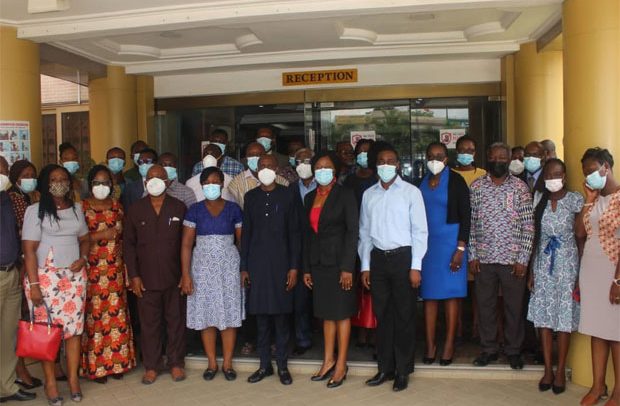Participants in a group photo after the first session
The Food and Drugs Authority (FDA) has held a two-day workshop for stakeholders to finalize the draft National Food Safety Emergency Response Plan (FoSERP) for adoption.
The development of FoSERP was part of recommendations presented by institutions responsible for food safety in 2019 to strengthen collaboration and coordination among agencies in the management of food safety emergencies.
The finalization workshop among other things was to ensure that all comments and contributions from stakeholders have been incorporated before the document is adopted.
Chief Executive Officer, FDA Delese A. Darko, said food safety systems were crucial because they formed the backbone of human life and in the spate of the pandemic, preserving human lives was the aim of the health system.
She, therefore, observed that FoSERP is crucial to the foundation of the food system, providing a guiding plan and an efficient blueprint for success in preventing, and reducing food hazards and illness.
“As the country progresses and reaches various timelines such as the Sustainable Development Goals in 2030, the factors influencing human life such as the food we eat were at the centre stage and in line with the FoSERP in ensuring the health and wellbeing of Ghanaians,” Mrs Darko said.
She commended partners including the World Health Organisation (WHO), the World Food Programme (WFP) and the Food and Agriculture Organisation for their support.
Head of Food Safety Management Department, FDA, Jocelyn Adeline Egyakwa-Amusah, said FoSERP after adoption will be implemented nationwide.
She explained that the document spells out the national plan to address threats along the food chain, clearly identifying agencies involved in the prevention, protection, mitigation, response and recovery efforts as well as the roles assigned to them.
Head of Public Education and Foodborne Disease Surveillance, FDA Benjamin Osei-Tutu, said the document covered all incidents along the food chain.
He said the FDA and its collaborating agencies were managing complaints on adverse events, recalls of unintentional contamination of food products that presented a threat of serious adverse health consequences or death to humans, and foodborne illness outbreaks and pandemics.
Dr Francis Kasolo, World Health Organisation (WHO) Representative to Ghana, said food safety continued to be a major concern worldwide with an estimated 600 million people, almost one in 10 people falling ill from eating contaminated food each year, resulting in 420,000 deaths and the loss of 33 million healthy life years.
He said a national food safety system that included a national system of information exchange were critical to manage food safety incidents and emergencies and to reduce the public health, economic and social impact from such incidents and emergency.
“The process does not end here, following the validation, we will need to put in measures for its implementation which again would require all our joint efforts.”
Madam Anna Mukiibi Bunnya, Deputy Country Director, World Food Programme, said food safety was important to achieving food security by ensuring that everybody had access to wholesome, safe, and nutritious food wherever they were and in whatever capacity.
By Jamila Akweley Okertchiri

